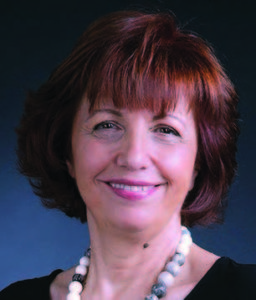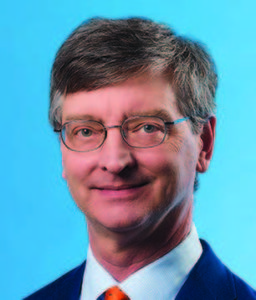Meet the Candidates for 2019 President-Elect/2020 President
Updated: Voting is now open. Deadline to vote is 24 September at 12 PM (Noon) ET.
Our final post regarding the 2018 election candidates is for the position of 2019 President-Elect/2020 President. The two candidates on the ballot are Leila De Floriani and William D. Gropp.
The candidate elected to this office will serve a 3-year term on the Executive Committee, broken down as follows: the first year as President-Elect, the second year as President, and then the final year as Past President, in 2021. The term will begin on 1 January 2019.
The President of the Computer Society has three main functions: to serve as the chief elected officer of the IEEE Computer Society, to represent the entire membership, and to provide leadership and direction for officers and society programs.
Here are links to read about the other open positions in this year’s election as well as the candidates running for them: Board of Governors, 2nd Vice President, and 1st Vice President.
Remember, voting begins on Monday, August 6, and lasts until September 24 at noon EDT.
Below, the candidates running for President with their position statements and biographies are listed in alphabetical order. Both candidates provided a website with more information about them and their candidacies.
 Leila De Floriani
Leila De Floriani
Position Statement
The IEEE Computer Society (CS) is the leading professional organization in computing with a mission to serve both researchers and practitioners. Its goals are to enable members to be at the cutting-edge of technical knowledge.
As the editor-in-chief of an IEEE Transactions, I have been at the forefront of implementing and successfully experimenting with highly innovative publication models based on strong interactions among CS activities. The adoption of synergistic modalities between conferences and journals is a compelling mandate that the CS must meet to enhance services and offerings, including introducing novel communication media for improved dissemination, such as author-produced short video summaries for journal issues and conference presentations. I will encourage and support publications and technical committees to work efficiently in this direction.
I have held positions in academic and research institutions in the US and Europe, and appreciate the different educational emphases on a worldwide basis, including Asia. This exposure has provided me with an understanding of the challenges and needs that different professional communities encounter for professional growth. I believe that I am in an excellent position to positively address these issues for all our members. Hence, one of my goals is to enhance our outreach to members in all regions through a multi-pronged initiative by which membership-based programs (such as student/professional chapters) will thrive, by sustaining focused initiatives (such as improving communication services for non-English speaking members) as well as global technical events, through, for example, the Distinguished Visitor program.
Another goal of my presidency is to enhance inclusiveness by increasing the diversity of our membership through outreach activities and the involvement of women and underrepresented groups, both as volunteers and in leadership positions in publications, conferences, and CS governance. I will also promote the enhancement of service recognition to our members as a further appreciative step for involvement in CS activities. In this respect, I am also very committed to the growth of students and young professionals. Activities and resources in support of new generations of scientists and engineers will be a priority in the operation of the CS.
In conclusion, if elected, I am committed to developing, enhancing, and promoting activities that support our members in their professional growth and foster inclusiveness and participation in the Society, while also addressing financial sustainability and providing value in terms of high-quality services, visibility, and research, all of which I pledge to uphold while serving as President.
Biography
Leila De Floriani is a professor at the University of Maryland, College Park. She has been a professor at the University of Genova (Italy) since 1990, where she developed the first undergraduate and graduate curricula in computer graphics in Italy, and served as director of the PhD program in computer science for eight years. During her career, she has also held positions at the University of Nebraska, Rensselaer Polytechnic Institute, and the Italian National Research Council.
De Floriani is a Fellow of IEEE and of the International Association for Pattern Recognition (IAPR), as well as a Pioneer of the Solid Modeling Association. She has been a member of the Board of Governors of the IEEE Computer Society since 2017. She is the chair of the 2018 Audit Committee and has served as a vice-chair of the Fellow Nomination Committee in 2017 and 2018. De Floriani is also an IEEE Computer Society Golden Core Member.
She is the editor-in-chief of the IEEE Transactions on Visualization and Computer Graphics (TVCG) and served as an associate editor for IEEE TVCG from 2004-2008. De Floriani is currently an associate editor of ACM Transactions on Spatial Algorithms and Systems, GeoInformatica, and Graphical Models. She has served on the program committees of over 150 leading international conferences, including several IEEE conferences, and has contributed to many conferences in a leadership capacity.
De Floriani has authored over 300 peer-reviewed scientific publications in data visualization, geospatial data representation and processing, computer graphics, geometric modeling, shape analysis and understanding, garnering several best paper awards and invitations as a keynote speaker. Her research has been funded by numerous national and international agencies, including the European Commission and the National Science Foundation.
For additional information, please visit: https://defloriani-ieee-cs-president-elect-candidate.umiacs.io/
 William D. Gropp
William D. Gropp
Position Statement
To me, the Computer Society is first and foremost just that—a society and a community. The job of the leadership of the Computer Society is to build and improve on the framework of that society to ensure that it meets the needs of its members and our profession. This is a challenging time for the Computer Society, which needs to examine what it means to be a professional society in the 21st century and how to adapt in order to thrive in this changing environment.
As president, I have three main goals:
Connect. We need to work on connecting those in our profession to the communities of researchers and practitioners in our Society. We must make membership more attractive to students and to those in industry as well as academia. Like much of computer science, our membership can and must be more diverse. We are a very international field; our membership must reflect that as well. Our most powerful tools in this endeavor are our conferences, journals, and technical committees. We must build on these.
Communicate. Working together, we can increase communication and make that communication more effective and efficient. Within the Society, we can provide more ways, both unstructured (e.g., a virtual suggestion box) and structured (e.g., ad hoc committees) to communicate with our membership. We are also part of the largest professional organization; we can work with IEEE and our sister societies to share ideas and to leverage our resources. We also must work with external partners to better understand their needs. I use “we” here because, as your president, I must lead in setting up and enhancing the frameworks for communication, we must all do our part to improve communication.
Explore and Adapt. In an era of change, no one has all of the answers. A more robust way to thrive in the midst of change is to explore different options, encourage competition, and see which ones work best. And with success comes the need to adapt; I know first-hand that what works for a conference of 100 is inadequate for a conference of 12,000. I will work with the Board of Governors to develop ways to create pilot projects to help us learn what works best.
See my website http://wgropp.cs.illinois.edu/ieeepres.htm for some specific ideas and for more information about me. I look forward to serving you as president of the Computer Society.
Biography
William “Bill” Gropp is Director and Chief Scientist of the National Center for Supercomputing Applications and holds the Thomas M. Siebel Chair in the Department of Computer Science at the University of Illinois at Urbana-Champaign. He received his PhD in Computer Science from Stanford University in 1982. He was on the faculty of Computer Science at Yale from 1982-1990. From 1990-2007, he was a member of the Mathematics and Computer Science Division of Argonne National Laboratory, including serving as associate division director.
Gropp is a member of the Computer Society Board of Governors, serving on ad hoc committees for awards and growth. As chair of Technical Program (2009), Finance (2011), and as General Chair (2013) of the SC conference, which at over 12,000 attendees is the largest conference co-sponsored by the Computer Society, Gropp has experience leading volunteers (almost 600 for SC) and running financially successful technical conferences.
He has played a major role in the development of the MPI message-passing standard. He is co-author of MPICH, the most widely used implementation of MPI. He has written many books and papers on MPI including “Using MPI.” He is also one of the designers of the PETSc parallel numerical library and has developed efficient and scalable parallel algorithms for the solution of linear and nonlinear equations. Dr. Gropp recently co-chaired the National Academy’s Committee on Future Directions for NSF Advanced Computing Infrastructure to Support US Science.
Gropp is a Fellow of ACM, IEEE, and SIAM and received the Sidney Fernbach Award from the Computer Society in 2008, and the ACM/IEEE-CS Ken Kennedy Award “for highly influential contributions to the programmability of high-performance parallel and distributed computers, and extraordinary service to the profession” in 2016. Gropp is a member of the National Academy of Engineering.
See more at http://wgropp.cs.illinois.edu.

Leave a Reply